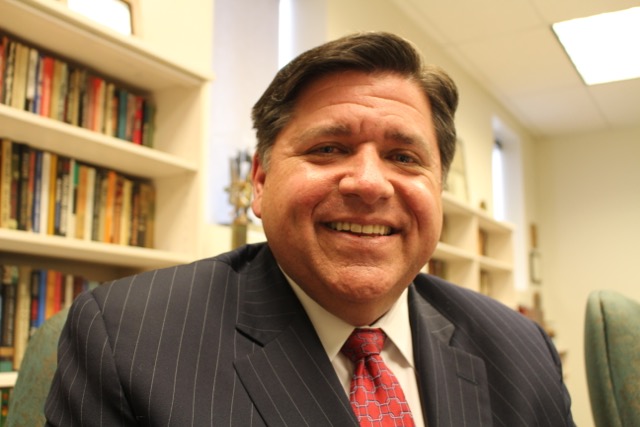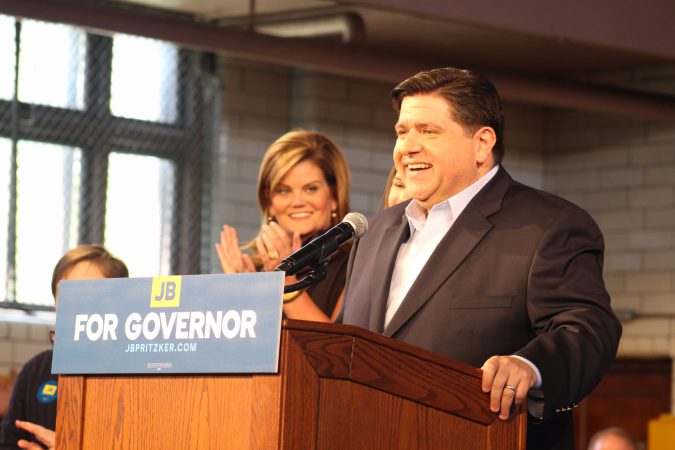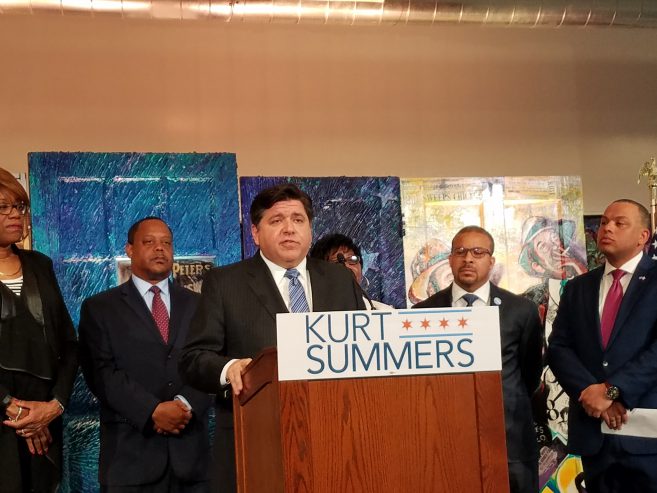
At a young age, Jay Robert “J. B.” Pritzker was taught the importance of having an independent voice in our American democracy. Born to Sue and Donald Pritzker, he was raised in a Jewish family with strong faith and solid beliefs in “tzedakah”—a Hebrew practice and philosophy of giving back for the common good.
“I grew up in a home where my parents helped to build the reform Synagogue that was in our community where I was bar mitzvah at the local synagogue. Fundamental to my religion and fundamental to my home life was this focus on social and economic justice,” Pritzker said.
“My parents were small business owners who built a small one into a big one, but just being in business doesn’t make up everything about you. It’s who you are, how you grew up, your faith and what you believe in. My parents had me knocking on doors at age 11 for candidates—progressive Democratic candidates. Because they believed that’s how you get the world to change.”
The Pritzker family name is a familiar fingerprint on some of the most prominent and low-key philanthropic programs throughout the country and specifically Illinois. Whereas, the Fields reigned Chicago’s aristocracy—the Pritzkers have become the leaders of building a family dynasty of wealth, political influence and philanthropic contributions that have impacted thousands.
Making His Own Way
Earlier this month, surrounded by his wife Mary Kathryn “M.K” Pritzker, and their two children—J.B. Pritzker made the official announcement of his candidacy for the 2018 Illinois governor’s race at the Grand Crossing park field house. Not a surprise to people in key political circles who are familiar with the billionaire venture capitalist and his commitment to the Democratic party.
Earning his A.B. in political science at Duke University, he attended Northwestern University School of Law to earn his J.D. In the mid-1990’s, Pritzker established the Pritzker Group Venture Capital, one of the largest investor firms in the country, with a concentrated focus on tech company investments. His estimated net worth is reported at $3.4 billion.
The businessman’s advocacy for entrepreneurship has led him to launch several companies, and he is a co-founder of the technology and innovation center 1871.
With numerous recognitions and awards by countless organizations that he and his family have endowed over the years—the 52-year old believes the way to change policy is from with inside the system. Pritzker is going to the communities that have been hit the hardest by the state stalemate—trying to raise the support of those feeling disengaged by the political process and the Democratic party.
“I think that one question is worth asking about all the candidates, particularly about African Americans, in Chicago and Illinois is what were they doing when they weren’t running for public office? In other words, it’s easy when you’re running to stand up and say, ‘I might do this and I do that —fake promises.’ I think too often the community has been promised things by politicians and it doesn’t get delivered. So, it’s worth asking about what they’ve done in the past to wonder whether they’ll deliver in the future,” said Pritzker.
With $250 million in state funding being withheld from CPS, it has put tremendous strain on an educational system that is already on life support.

Pritzker says his work has been dedicated to children from low-income communities. “I focus on children—Black and brown children. For example, for several years, I’ve been a national leader on early childhood education, early learning—quality childcare and quality pre-school. Thousands of kids get quality pre-school and childcare because of the work that I’ve done,” he continued. “These are kids that are at risk, low income, often Black and brown communities. That’s work that I’ve been dedicated to for many years. Whether I win or lose as governor, I will continue to do the work. If I win—that work will be expanded greatly in the state of Illinois.” He says, part of his work has included chairing the Illinois Human Rights commission, the state’s civil rights court.
“We eliminated the backlog in a bipartisan fashion with my leadership. People put ‘shoulder to the wheel’ to help us get done. I ran that commission for three years.”
Public Safety and the Criminal System
On criminal justice, Pritzker has worked with Cook County Board President Toni Preckwinkle on some of these efforts. “The Child and Family Justice Center is another one I endowed and that’s focused on juvenile justice and detention, getting kids out of that system and keeping them out. Also, both of those organizations are focused on changing public policy,” he explains.
“Even if you live a life that’s free of any interaction with the law, you still have this mark sitting on your records—it can prevent you from getting employment, an apartment. It shouldn’t be that way. You shouldn’t have to hire a lawyer to get it off your record when you when a mistake at 15, 16 or 17 years old or younger. It should automatically be taken it off.”
Pritzker says the on-going violence is a long-term buildup of economic disenfranchisement in low disparity areas throughout the state and not having preventative programs in place is a direct result of not having a state budget.
“Fighting the violence problem is also about building our human services in this state. They’ve been torn apart about not having a budget. The fact that people are losing hope is a big reason why people end up picking up a gun. If you can’t stabilize your life and you can’t get a job, there’s no one giving you a little bit of a helping hand. We need to solve the problem before it becomes a bigger problem. It’s an economic problem to begin with and that’s what I intend to do as governor,” said Pritzker.
Governor Rauner and Mayor Emanuel
Through ad buys Republicans have called out Pritzker’s support of Illinois Speaker Mike Madigan, asking who is really pulling the strings. “I’m an independent leader, I’m an independent thinker. My view is that the governor of the state of Illinois, whoever they may be, needs to work with the mayor of the city of Chicago, whoever they may be, to get things done for the state. The city of Chicago is part of the state so you must have a relationship. There is no relationship today between the governor of Illinois and the mayor of Chicago—that must change. You don’t get to say, ‘I don’t like that personality.’ You don’t have that luxury. The point is the kids are at stake, the city is at stake. The economic engine is also at stake.”
He says the governor “doesn’t get to tell the mayor or the city council what they should do.” But as a loyal Democratic, Pritzker is determined to win back the African American base that was lost in the 2014 gubernatorial election. To add further damage to an open wound—Donald Trump’s victorious win in the presidential election captured 13 percent of African American male voters.
“The Republican party has never done anything as long as I’ve been alive for the African American community. That’s not really an option—Trump is certainly not an option. Trump’s answer is troops are everything except for rebuilding the infrastructure for the African American community, building up wealth or building up ownership in the community or making the community a success.”
However, the gubernatorial hopeful is not letting members of the Democratic Party off the hook. “Do all Democrats do the right thing? No. Am I going to make a plea to you on behalf of the Democratic Party that African American voters need to be Democrats? I’m not going to make that plea to you. I am going to make the plea, there are better leaders in the Democratic Party for the community, for our state than the Republican Party and certainly in the case for governor.”

Recent Endorsement
On Wednesday morning, City Treasurer Kurt Summers called for a special announcement at Gallery Guichard in the heart of the Bronzeville community to official endorsement of the Democratic candidate.
Also, challenging Gov. Rauner are Democratic candidates: businessman Chris Kennedy and Alderman Ameya Pawar, who have some serious fundraising efforts underway as Pritzker adds $7 million of his personal funds to his campaign chest. He understands the stakes are high to go toe-to-toe against Rauner’s deep pockets.
“My parents passed away when I was young. My father when he was 39, my mother when she was 49. But their fundamental values are the things they taught me, as I grew up. They carry me every day, I think about those values now,” he pauses.
“What matters in the world? Am I making them proud? Because I want to make my parents proud. I think I’m doing that in the ways that I can everyday—trying hard. Sometimes we fail, but every day when I wake up, [I] think to myself: what can I do to make the world a little better?”
Follow Mary L. Datcher on Twitter
Check out Part One of the Chicago Defender Editorial interview: